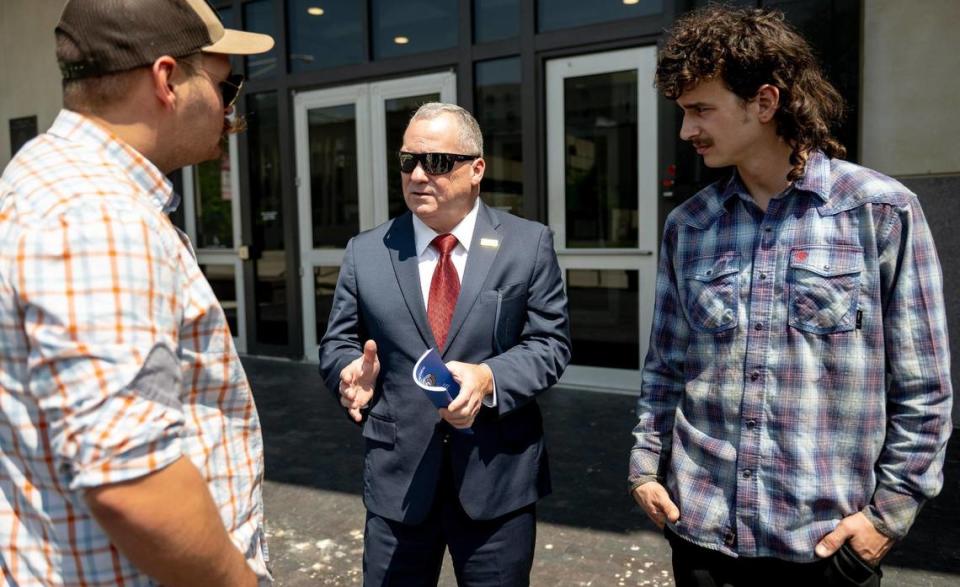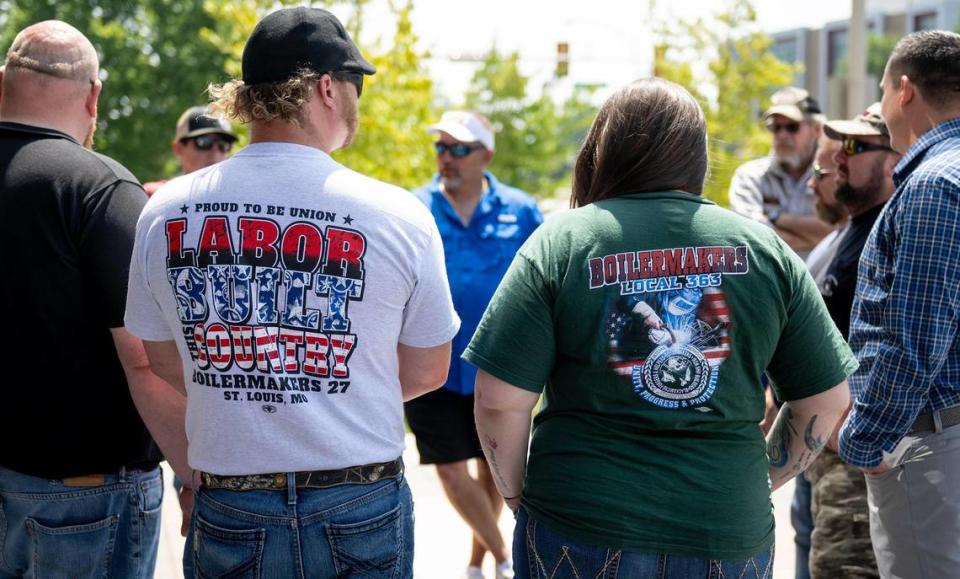Federal judge upholds ouster of Boilermakers union president by his own top executives
- Oops!Something went wrong.Please try again later.
- Oops!Something went wrong.Please try again later.
Newton B. Jones, the embattled leader of the Kansas City, Kansas-based International Brotherhood of Boilermakers, is out as the union’s longtime international president, a federal judge ruled Tuesday.
In what he called a preliminary ruling from the bench, Chief Judge Eric F. Melgren, of the U.S. District Court for the District of Kansas, upheld a June 2 decision by the union’s top executives to remove Jones as president.
“As of that day, Mr. Jones was removed from office,” Melgren said. The judge said he would issue a final, written ruling on the issue within the week.
After the hearing, members of the union’s executive council said they’d unanimously elected former International Vice President Warren Fairley, who retired in February, to be the union’s new leader.
The judge’s ruling came at the end of the third hearing in the past two months on the contentious issue that began when the union’s executive council voted to oust Jones for allegedly misusing union funds for personal gain — including funneling large sums of money to his Ukrainian wife for work she never performed.
“This is historic,” said Tom Baca, of California, one of the union’s five international vice presidents. “This is a huge victory. What a roller coaster ride.
“We won for the union, we won for the members and for all the brothers going forward.”
Baca said improvements within the union were already in the works.
“Our international (union) has been sinking — we’ve lost 40 percent of our membership since Jones has been in office,” he said. “We’re going to start growing it back. There are lots of major changes coming quickly.”

The International Brotherhood of Boilermakers, Iron Ship Builders, Blacksmiths, Forgers and Helpers was established in 1880 and is one of the nation’s oldest unions. It represents about 46,000 workers in the United States and Canada who assemble, install and repair boilers, fit pipes and build power plants and ships.
In a letter sent late Tuesday afternoon to “Lodge Leaders, Members, Affiliates, Partners and Friends of the Boilermakers,” Fairley called the judge’s decision “a new day for the International Brotherhood of Boilermakers” and said it meant “that our organization can move forward.”
“There will be further actions, including an audit to determine what Mr. Jones owes and continued efforts to collect those amounts from him,” wrote Fairley, of Lucedale, Mississippi. “This will likely be a long process, but we are dedicated to recovering funds from him and anyone else who misused our funds. We are dedicated to correcting any abuses.”
Jones sat emotionless throughout Tuesday’s hearing. He told The Star afterward that he was disappointed with his executive council.
“We have a constitution,” he said. “We can’t treat it like it’s been treated. I believe I’ve followed it and have done everything that’s been expected of me. I don’t believe the international vice presidents have.”
Jones, 70, who has led the union since his father retired in 2003, said he planned to “get on with my life.”
“I’ve spent 52 years with this union, and I’ve done a lot of great things for this union,” he said. “And for these guys to take this action? Of course I’m disappointed.”
As for the allegations of financial malfeasance, he said, “That’s all bullshit.”
The executive council’s June 2 decision also ordered Jones to be removed from union membership. And Jones, the longtime chairman and CEO of the union-owned Bank of Labor, resigned from that position earlier this month, union officials said Tuesday.
Prior to Tuesday’s hearing, union members weren’t sure who was in charge. Jones had refused to step down after his ouster, and the executive council members who removed him had named Fairley as the new president. Jones, under the guise of the union, sued the executives, asking for an injunction to reverse their decision to remove him. The union executives then filed a countersuit, asking for an injunction upholding their decision.
At a June 20 court hearing, Melgren left Jones in place, ordering that the union leadership remain in “status quo” until the case was resolved. Then last month, Jones announced he was retiring and named a union member from Canada as his successor.
After a July 27 hearing, Melgren ruled that the union executives had not met the high burden of proof necessary for the injunction to be granted. But Melgren also said that Jones’ appointment of a successor was “highly suspect” and violated his June 20 order that the union remain in status quo.

Melgren said he also had concerns about a new filing in the case claiming that Jones, his wife, Kateryna, and union Secretary-Treasurer William Creeden had recently been paid $500,000 “for purported unused vacation.” Those figures were later updated, saying Newton Jones received $107,733; his wife, $111,057; and Creeden, $484,800. Melgren said the action was “of questionable validity and in violation of the Court’s injunction.”
After Jones announced he was retiring, the union executives filed a new motion asking that their request for an injunction be converted into a motion for summary judgment, which would end the case before it went to trial.
Melgren said that process wouldn’t work, in part because new issues had arisen in the case, including the vacation pay and Jones’ appointment of an interim president.
But because “the parties have demonstrated an unusual capacity for mischief, leading the Court to determine that time is of the essence,” Melgren said he would hold a hearing on Aug. 15 on any motions for summary judgment the parties wanted to file.
The international vice presidents took him up on that, filing a motion on Aug. 7 asking the court to rule that their removal of Jones was valid.
At Tuesday’s hearing, their attorneys argued that the judge should issue a declaratory judgment against Jones because they had followed the process laid out in the union’s constitution to remove him. They also said Jones didn’t attend the disciplinary hearing on the charges lodged against him and that because he didn’t file a timely appeal to their decision to oust him, he was bound by its terms.
In their Aug. 7 motion, the executive council also said that Jones had continually refused to abide by their June 2 decision, including attempting to name his own successor and failing to repay the union membership the money he had allegedly misspent.
Jones’ attorney, Sam Gladney, argued that the executives’ motion for summary judgment be denied, saying Jones had not received adequate notice of their May 30 disciplinary hearing on the allegations against him and that he was denied an opportunity to review the evidence presented against him. Jones didn’t attend the May 30 hearing, but sent two people.
Gladney also argued that the charges regarding some of Jones’ expenditures were not specific enough, which prejudiced his ability to prepare a proper defense for his disciplinary hearing.
The allegations were that Jones had ordered the union to give Kateryna Jones more than $100,000 plus benefits in back pay “for apparently no union purpose while she was living in the Ukraine” and spent more than $20,000 in union funds for flights to Ukraine “to visit his wife and to go to the home which he owns in the Ukraine.”
Jones and his wife also turned in about $40,000 in receipts for meals for them and other family members when at their home in North Carolina — some “quite lavish and expensive” — with no justification for the expenses, the executive council found.
In the end, Melgren didn’t buy Jones’ arguments. He noted that Jones did not request more time to respond to the allegations, nor did he ask for more details on his alleged expenditures.
And he didn’t even attend the hearing, Melgren said, instead relying on a committee he had appointed to conduct its own investigation into the allegations.
“That’s a gamble that he took,” Melgren said. “That’s a gamble that he lost.”

